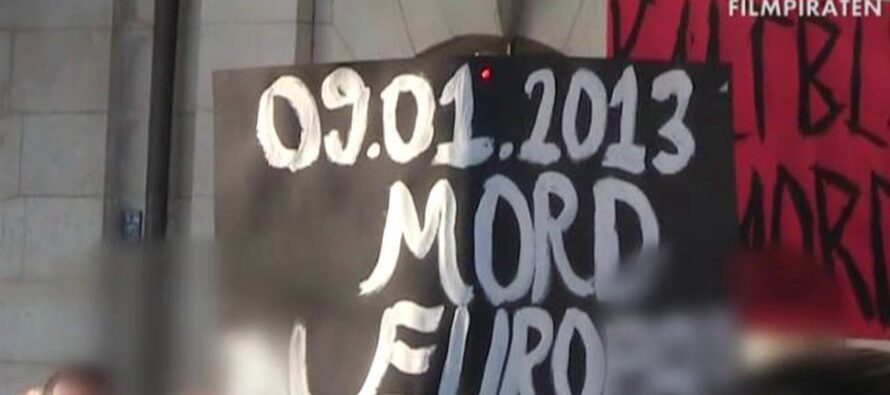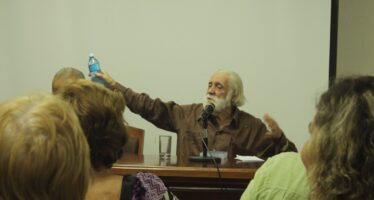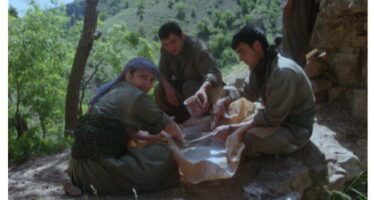The women revolution of Kurdistan – Sakine Cansiz – Part Two

![]()
The Kurdish Liberation Movement made up of a group of Kurdish and Turkish youths, known as pro-Apo (Öcalan) and -national liberation groups till 1978, became a party following the first congress held in the house of the Zoğurlu family, which supported the organization since its formation, in the Fis village of Diyarbakır’s Lice district on 26-27 November. The PKK (Kurdistan Workers’ Party, Partiya Karkerên Kurdistan) has become a public movement addressing millions during the 35 years that have passed since the first congress which had been attended by 22 delegates.
Among those attending the congress was also Sakine Cansız, a co-founder of the Kurdistan Workers’ Party (PKK), who was murdered in Paris on 9 January 2013 together with Fidan Doğan, Kurdistan National Congress (KNK) representative in Paris and Leyla Şaylemez, member of the Kurdish youth movement.
Years ago, Cansız had told us about her first years in the Kurdish struggle and her search for a free life. She told us details of how she met revolutionaries of Kurdistan, how she was affected by them and how she joined revolutionary activities in the Kurdistan territory.
In this second part Sakine Cansiz tells about the First PKK Congress.
Part Two
We went to the congress with a bus. On the way to there, we took a break in Maden. A comrade was waiting for us when we reached there. Me and Cuma then went to the house where the leader was waiting. He was sitting, with some books standing before him.
He asked us about our preparations and whether we had read the draft program or not. Me, Kesire, the leader and comrade Cuma took the way to the congress witha taxi. Along the way, the leader asked about the villages we were passing by on our route. If I am not mistaken, the driver was comrade Seyfettin, someone fromthe Zoğurlu family. Kesire didn’t even say a single word, while Cuma was sometimes answering the leader’s questions. Some other comrades were already there when we reached the village of Fis. The others came after us and the Congress officially began after everyone came.
Of course we didn’t know all delegates at that time. The leader, Hayri, Mazlum, Abbas, Fuat, Davut, Resul Altınok, Mehmet Turan, Mehmet Şener, Ferzende Tahaç, Baki, Ali Gündüz were all there. Karasungur wasn’t there.
Fatma and I were the only women attending the congress. The leader asked Hayri to preside the council. He made the opening speech in which he made an evaluation on the purpose and aims of our movement and explained the reasons for the arising of the need for such a work and organization. Following his evaluation, the draft program was read and reviewed. Mazlum, Hayri and other comrades expressed their opinions about some subjects. Then the regulation was discussed in detail. Everything was being read and watched with great attention. You could breath the environment of great experience and responsibility there. You could feel the responsibility which seemed to be getting heavier every passing moment. The environment arose a feeling that the revolution wasn’t going to be easy and needed to be led with great patience and attention. All delegates from all regions told about the works in their regions. Our movement displayed a self-critical approach since the very beginning. During the congress, a debate took place about the factors, elements, structures and people that constituted an obstacle in the areas of struggle. The debate focused on the treatment of these obstacles and a struggle to be given against them. Many comrades said they didn’t find themselves suitable for elections for the central management. Some proposed Mazlum, Hayri and Cuma, while Şahin proposed himself, to which the leader responded ‘maybe’. The names were later decided, consisting of the leader, Karasungur and Şahin. We were told that the central management would be enlarged at another meeting. The management staff was therewith determined and enlarged at the meeting in April. The debate on the name of the party didn’t last long and there were not many proposals put forward. Communist Party was also among the proposals but it was later decided on Kurdistan Workers’ Party. At the closing speech, the leader assessed the results of the congress which lasted two days. All of us turned back to our areas after the meeting.
The next day we got back to Elazığ with the excitement of the congress and the duties and responsibilities it laid on us. We didn’t mention about the congress very much and kept it secret. A liveliness and intense period of work started to be developed at committees after the congress. Our preparations made an appearance at Newroz. It was in Elazığ region in particular that gave an answer to Maraş Massacre which was mainly supported by fascist circles from Elazığ. The state was making preparations for leading to other similar massacres in Sivas, Elazığ, Bingöl by creating an Alewi-Sunni conflict. We made a move before they did.
They chose Maraş as a weak link and used the already existing Alewi-Sunni conflict in that region. Besides, the massacre was a response to the birth of a ground leading to the organization, unity, awakening and common will of the Kurdish people. The massacre aimed to intimidate our movement. Had they been able to find some other ground and had we failed to take precautions and respond to it with our struggle, they may have tried doing the same thing in some other places too.
I had a region-level responsibility in the organization, I was taking part in the regional committee. In early 78, I stayed in Bingöl for some time before I came to Elazığ where I stayed until the congress and after that. After the congress, I was assigned a duty in propaganda-agitation works in predominantly in Antep and then in Elazığ in time. We were producing our notice papers, leaflets and other means of propaganda and agitation and sending them to other regions. I stayed in Elazığ and took an active part in works until I was arrested.
Our purpose was to declare the congress with an expansive act targeting reactionary centers, particularly some tribal structures that applied intense pressure on the people. However, we delayed our act because of the arrest of some of us. It was only the leading staff that knew about the congress but still kept it secret inside the organization. Still, others were feeling that we were advancing towards a new organization and structuring.
We needed to be very careful about our way of acts in our new work period. We were active in cities but we had been told to protect ourselves and warned that the staff could wend head towards rural areas in the event of an attack by the state. As the Maraş Massacre was followed by the announcement of a martial rule, and our names were uncovered, we were discussing on the attitude to display and the way to follow in the face of the changing attitude of the state. We intensified our works and developed expansive acts, especially at the Newroz of 79. This advance of course mobilized the state and a group among us, including Aytekin, was arrested in a cafe in Fevzi Çakmak neighborhood in early May. We therewith took measures and left the houses we were living in. some of those arrested talked to the police. In the same period, Şahin Dönmez came near us. He was insisting that nothing would happen to us, while we were criticizing and objecting to him, defending that we should turn our steps towards rural areas. His comfortableness misled us and we continued to stay in cities because he was a senior and more authorized than us. Then police raided our house early 17 May and arrested the second group; me, Hamili and his wife Ayten Yıldırım. Şahin didn’t leave Elazığ after our arrest and he was living in the open, in places that police could easily raid. The third group which also included Şahin was also arrested several days after our detention. Şahin started to talk to police and told about everything yet on the first day of his arrest and before being beaten in custody. He seemed to be ready for betrayal since the very beginning. The police therewith started to move on the basis of his statements and the information he gave. Many other comrades were arrested in the following intensified operations targeting us in the region.
There was a heavy torture in prisons in general terms but the treatment towards us was particularly different for we were the a new power which seemed to be the most dangerous one in comparison to other organizations. The state was actually trying to get to know us because of the quite different ideology we had. Basing on earlier experiences, they were trying to end our movement by means of the people they arrested. They had attacked a number of other movements, arrested, tortured and executed their leading staff and mainly accomplished a result. To them, our advancing movement in Kurdistan needed to be finished before further progress but they were wrong because we had a leadership system which was quite different than other organizations. Despite the betrayal of Şahin Dönmez and self-revelation of some others, the truth it was not going to be easy at all to take our movement under control and to finish it.
Our movement addressed to the essence of men, as we always started with humanity in all our debates, trainings and speeches on our ideology. We started on the basis of human values, the first creation of humanity and the historical phases it went through, thus at the same time revealing the truth of the Kurdish people as well. This approach inspired a great interest for it scientifically revealed the truth, our essence,which we weren’t aware of at all and we all had grown away from. This essence is as a matter of fact the essence of women whose creation power was the leading and determining factor at the beginning of the human history. The history of Kurdistan is at the same time the history of women. This is the reason why our movement aroused a remarkable interest and all women in search of identity joined our movement. This was not a difficult gathering at all. Despite all the obstacles by the social system and the family structure, our movement pulled women toward itself because of this stance and approach. Besides, the leader also advanced this approach by involving women in this revolutionary uprising and struggle in Kurdistan from the very beginning, which was a quite difficult work.
Before the congress, we had also focused on the probability of building a women’s organization and union which would be active in operational, organizational and propaganda-agitation areas. On the way to the congress, I took some not very expansive but formulated notes on the subject. While picturing the situation of regions during the congress, we also had debates on involving women in the revolution. I very much intended to talk about the idea of women’s organization but I was unsettled about to what extend this attempt could be succeeded and formulated. I just voiced some proposals to man comrades, suggesting that they themselves should give an effort to involve their closest woman relatives, their sisters, wives and mothers, in the revolutionary movement.
The matter of women’s organization was then discussed in the process of the development of the democratic revolution. Clear assessments and determinations were made about women’s role in the society,their liberation and their treatment on a free and equal ground. This matter was handled as the basic issue and the essence of democratic revolution.
The leader handled the woman issue in much detail. He was actually displaying an attitude for the expansion of the struggle to all areas. In talking over the woman problem, we handled the historical aspect of women, as well as their roles and treatment by revolutionary leaders in other uprisings in the world. We lived some ideological and political discussions on the subject but the leader was going into the effort of entirely involving women in the struggle. Since the beginning, our movement has been based on leading the revolution together with women. In doing this, it also aimed to develop new revolutionary measures, refusing to treat women under their present conditions or involving them in some certain areas alone. It also gave a fight against the dominant mentality in women, men and the system. Woman comrades take different charges and went to different areas, which created courage and confidence and developed a new tradition.
Related Articles
Palestinian Poet Dareen Tatour Sentenced to 5 Months; Create Art To Help Fight Her Conviction
![]()
Dareen Tatour has already spent more than two years and eight months between prison and house arrest for “incitement to violence”
Yo soy el Rufo y no me rindo, por Daniel Chavarria
![]()
El viernes 16 de Junio en la histórica sede de la UNEAC (la Union Nacional de los Escritores y Artistas de Cuba) en La Habana, se presento la última obra publicada por el escritor uruguayo-cubano Daniel Chavarria
Poems from a guerrilla Autumn A poetry book from Kurdistan to appreciate the value of freedom
![]()
Autumn is the title of a little, precious book of poems, thoughts, fragments of lives. A book of partisan notes from Kurdistan, as the curators say




